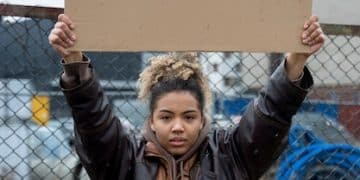US Diplomacy: Examining Successes & Failures in Global Conflict Resolution

Examining the Role of US Diplomacy in Resolving International Conflicts: Successes and Failures reveals a complex interplay of strategic initiatives, historical contexts, and varying global perceptions impacting the effectiveness of American diplomatic interventions.
The effectiveness of US diplomacy in resolving international conflicts: successes and failures is a subject of ongoing debate. Understanding the nuances of these diplomatic efforts is crucial for shaping future foreign policy strategies.
The Historical Context of US Diplomatic Efforts
US diplomatic engagement in international conflicts has evolved significantly over time. From the post-World War II era to the present day, American diplomacy has played a pivotal role in shaping global events.
Understanding the historical underpinnings of these efforts provides valuable context for assessing current strategies and future approaches. Let’s explore some key moments and shifts in US diplomatic history.
Early Diplomatic Strategies
In the aftermath of World War II, US diplomacy focused heavily on containment of the Soviet Union and promoting democratic values. Key initiatives included the Marshall Plan and the formation of NATO.
These early strategies aimed to rebuild war-torn Europe and establish a strong alliance against communist expansion, laying the foundation for decades of US foreign policy.
The Cold War Era
The Cold War saw US diplomacy engaged in numerous proxy conflicts and negotiations with the Soviet Union. Diplomatic efforts were often aimed at preventing direct confrontation while safeguarding American interests.
- Nuclear Arms Control: Negotiations such as the Strategic Arms Limitation Treaty (SALT) aimed to reduce the risk of nuclear war.
- Proxy Wars: US involvement in conflicts like the Korean War and the Vietnam War highlighted the challenges of containing communism.
- Diplomatic Standoffs: Events like the Cuban Missile Crisis tested the limits of US diplomatic leverage.
The Cold War demanded skillful navigation of complex geopolitical tensions, often requiring a delicate balance between confrontation and cooperation.

Ultimately, the historical context of US diplomatic efforts reveals a continuous evolution in response to changing global dynamics. Adapting to new challenges while maintaining core values remains a central theme.
Success Stories: When US Diplomacy Worked
Despite the complexities and challenges, there have been instances where US diplomacy has achieved significant success in resolving international conflicts. Studying these examples provides valuable insights into effective strategies and approaches.
These success stories underscore the potential for diplomacy to positively impact global stability and promote peaceful resolutions. Let’s examine a few notable cases.
The Camp David Accords (1978)
The Camp David Accords, brokered by President Jimmy Carter, brought together Egyptian President Anwar Sadat and Israeli Prime Minister Menachem Begin. The result was a peace treaty between Egypt and Israel.
This agreement, which earned Sadat and Begin the Nobel Peace Prize, demonstrated the power of sustained diplomatic engagement and patient negotiation to overcome longstanding animosities.
The Dayton Agreement (1995)
The Dayton Agreement, facilitated by US diplomat Richard Holbrooke, ended the Bosnian War. Through intensive negotiations, the agreement established a framework for peace and stability in the region.
The agreement highlighted the importance of strong diplomatic leadership and international cooperation in addressing complex humanitarian crises and preventing further loss of life.
The Iran Nuclear Deal (2015)
The Iran Nuclear Deal, also known as the Joint Comprehensive Plan of Action (JCPOA), was a multilateral agreement aimed at preventing Iran from developing nuclear weapons. It involved the US, Iran, and other world powers.
- Diplomatic Negotiations: Years of intense negotiations led to the agreement’s creation.
- International Cooperation: The deal involved multiple countries working together towards a common goal.
- Verification Mechanisms: The agreement included measures to verify Iran’s compliance.
While controversial, the JCPOA demonstrated the potential for diplomacy to address critical security concerns through verifiable and enforceable agreements.
In summary, the success stories of US diplomacy reveal the importance of sustained engagement, strategic vision, and international collaboration in achieving peaceful resolutions to complex conflicts.
Failures: Instances Where US Diplomacy Fell Short
Alongside the successes, there have been instances where US diplomacy has failed to achieve its desired outcomes in resolving international conflicts. Analyzing these failures provides critical lessons for improving future diplomatic efforts.
Understanding why these diplomatic initiatives fell short can help policymakers avoid similar pitfalls and develop more effective strategies. Let’s consider some notable examples.
The Vietnam War
Despite extensive diplomatic efforts, the US was unable to achieve a lasting resolution to the Vietnam War. Diplomatic talks often stalled due to fundamental disagreements and shifting political dynamics.
The war highlighted the limitations of diplomacy when faced with deeply entrenched ideological divides and complex geopolitical considerations.
The Israeli-Palestinian Conflict
US diplomatic efforts to resolve the Israeli-Palestinian conflict have been ongoing for decades, yet a comprehensive and lasting peace agreement remains elusive. Numerous peace initiatives have failed to bridge the gap between the two sides.
The conflict underscores the challenges of addressing long-standing historical grievances and competing national aspirations through diplomatic means.
The North Korean Nuclear Crisis
Despite numerous rounds of negotiations, the US has been unable to persuade North Korea to abandon its nuclear weapons program. Diplomatic efforts have been complicated by trust deficits and shifting geopolitical dynamics.

- Lack of Trust: Mutual suspicion and mistrust have undermined diplomatic progress.
- Shifting Priorities: Changes in US administrations have led to inconsistent diplomatic approaches.
- Geopolitical Tensions: Regional rivalries and external influences have complicated the negotiation process.
The North Korean nuclear crisis highlights the difficulties of using diplomacy to address deeply entrenched security concerns and complex geopolitical considerations.
In essence, the failures of US diplomacy reveal the importance of understanding the limitations of diplomatic power and the need for adaptive strategies that account for evolving geopolitical realities.
Key Factors Influencing the Success or Failure of US Diplomacy
Several key factors play a significant role in determining the success or failure of US diplomatic efforts in resolving international conflicts. Understanding these factors is crucial for crafting effective diplomatic strategies.
Analyzing these elements allows policymakers to better assess the prospects for diplomatic success and tailor their approaches accordingly. Let’s examine some critical considerations.
Strategic Alignment
The degree to which US diplomatic goals align with the interests of other involved parties is a critical factor. Diplomacy is more likely to succeed when there is a convergence of strategic objectives.
Misalignment of interests can lead to protracted negotiations and ultimately, diplomatic failure. Therefore, a clear understanding of each party’s priorities is essential.
Credible Leverage
The ability of the US to exert credible leverage, whether through economic sanctions, military deterrence, or diplomatic pressure, can significantly influence the outcome of negotiations. However, leverage must be used judiciously.
Overreliance on coercive measures can backfire and undermine diplomatic efforts. A balanced approach that combines incentives and disincentives is often most effective.
International Support
Broad international support for US diplomatic initiatives can enhance their legitimacy and effectiveness. Multilateral approaches that engage other countries and international organizations are often more successful.
Unilateral actions, on the other hand, can alienate allies and undermine the prospects for diplomatic success. Building coalitions and fostering international cooperation is therefore essential.
In summary, strategic alignment, credible leverage, and international support are crucial factors that influence the success or failure of US diplomacy in resolving international conflicts. Careful consideration of these elements is essential for crafting effective diplomatic strategies.
The Role of Soft Power in US Diplomacy
Soft power, the ability to influence others through attraction rather than coercion, plays a significant role in US diplomacy. It encompasses cultural influence, values-based diplomacy, and public diplomacy initiatives.
Leveraging soft power can enhance the effectiveness of US diplomatic efforts by fostering goodwill and building trust. Let’s explore the various dimensions of soft power and its impact on conflict resolution.
Cultural Diplomacy
Cultural exchange programs, educational initiatives, and artistic collaborations can promote mutual understanding and bridge cultural divides. These efforts can create a more favorable environment for diplomatic engagement.
By showcasing American values and culture, the US can enhance its global image and foster positive relationships with other countries.
Values-Based Diplomacy
Promoting democratic values, human rights, and the rule of law can enhance US credibility and moral authority on the global stage. However, these efforts must be pursued consistently and without hypocrisy.
Inconsistencies in the application of values-based diplomacy can undermine its effectiveness and credibility. A commitment to universal values is essential.
Public Diplomacy
Public diplomacy involves engaging directly with foreign publics through various communication channels, including social media, public forums, and media outreach. These efforts can shape public opinion and build support for US foreign policy goals.
Effective public diplomacy requires understanding the cultural and political context of the target audience and tailoring messages accordingly. A nuanced and culturally sensitive approach is essential.
In conclusion, soft power is a valuable tool for US diplomacy. By leveraging cultural influence, values-based diplomacy, and public diplomacy initiatives, the US can enhance its ability to influence others and promote peaceful resolutions to international conflicts.
Future Directions for US Diplomacy
As the global landscape continues to evolve, US diplomacy must adapt to new challenges and opportunities. A forward-looking approach that embraces innovation and fosters international cooperation is essential.
These future directions can help ensure that US diplomacy remains effective in addressing complex global challenges. Let’s explore some key considerations.
Embracing Digital Diplomacy
The rise of digital technologies has created new opportunities for diplomatic engagement. Digital diplomacy involves using social media, online platforms, and other digital tools to communicate with foreign publics and engage in policy discussions.
Effective digital diplomacy requires understanding the dynamics of online communication and tailoring messages accordingly. A strategic and proactive approach is essential.
Strengthening Multilateral Partnerships
Addressing complex global challenges requires international cooperation. Strengthening partnerships with other countries and international organizations is therefore essential for US diplomacy.
Multilateral approaches can enhance the legitimacy and effectiveness of diplomatic efforts. Building coalitions and fostering a shared sense of responsibility is crucial.
Investing in Diplomatic Capacity
Maintaining a strong and capable diplomatic corps is essential for US foreign policy. Investing in language training, cultural awareness programs, and professional development can enhance the effectiveness of US diplomats.
- Language Training: Fluency in multiple languages is essential for effective communication.
- Cultural Awareness: Understanding different cultural norms and values is crucial for building relationships.
- Professional Development: Continuous learning and skill-building are essential for keeping pace with evolving global challenges.
In summary, embracing digital diplomacy, strengthening multilateral partnerships, and investing in diplomatic capacity are key directions for US diplomacy in the future. A forward-looking and adaptive approach is essential for navigating the complexities of the 21st-century world.
| Key Point | Brief Description |
|---|---|
| 🤝 Camp David Accords | Successful peace treaty brokered by the US between Egypt and Israel in 1978. |
| 🕊️ Dayton Agreement | US-facilitated agreement that ended the Bosnian War in 1995. |
| ☢️ Iran Nuclear Deal | Multilateral agreement aimed at preventing Iran from developing nuclear weapons. |
| 🌐 Soft Power | Influence through attraction rather than coercion, enhancing US diplomatic efforts. |
Frequently Asked Questions
▼
The main goal is to promote peaceful resolutions that align with US interests, global stability, and democratic values. Diplomacy seeks to prevent escalation and protect American security.
▼
Challenges include mistrust between nations, complex geopolitical scenarios, and the rise of non-state actors. Economic disparities and cultural differences also complicate diplomatic efforts.
▼
Balancing involves integrating democratic values and human rights into foreign policy. The US often supports initiatives for governance and development, aligning with these principles.
▼
The UN offers a platform for multilateral diplomacy, allowing the US to collaborate with other nations on global issues. It enhances the legitimacy and effectiveness of US diplomatic efforts.
▼
Adaptation involves embracing digital diplomacy, strengthening multilateral partnerships, and investing in diplomatic capacity. These strategies enhance flexibility and relevance in addressing contemporary issues.
Conclusion
In conclusion, examining the role of US diplomacy in resolving international conflicts: successes and failures reveals a complex and multifaceted landscape. While there have been notable achievements, such as the Camp David Accords and the Dayton Agreement, there have also been significant setbacks, including the Vietnam War and the ongoing challenges in the Israeli-Palestinian conflict. Ultimately, the effectiveness of US diplomacy depends on a variety of factors, including strategic alignment, credible leverage, international support, and the skillful use of soft power. As the world continues to evolve, US diplomacy must adapt to new challenges and opportunities by embracing digital technologies, strengthening multilateral partnerships, and investing in diplomatic capacity.





